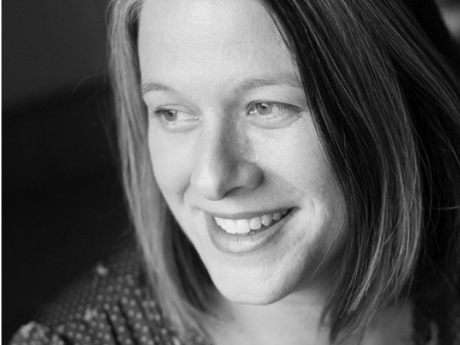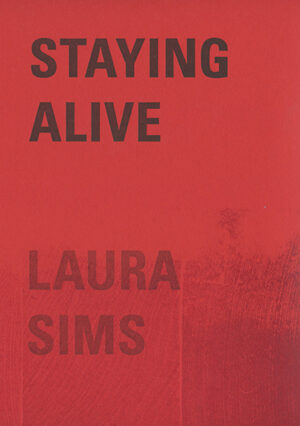In Their Own Words
Laura Sims on “Staying Alive”

Staying Alive (an excerpt)
Down the ill-made road, minds swaying
Our batteries
What is that
Flicker in the sky
That swift liquefaction
That masked and expectant
Black muzzle
That overhead the dawn
That limbs and tentacles, followed by
Night
And a devil of a row
*
A prolonged ululation: pantry vessels
Ring and shift as the social body
Is
Gutted, slashed
And gutted
*
The earth became a sea that rocked our house and power
Fled the grid and pummeled
Into me
The red glow from the East the burning docks
A boat with no one on it brought
A startling, sharp joy: behold
The searchlights'
Lustrous
Fugitive
Humanity
*
Astonishment
Turned
Into something
Wet leather
Where men
Had stood for a moment, a moment ago
From Staying Alice (Ugly Duckling Presse, 2016). All rights reserved. Reprinted with the permission of the author.
On "Staying Alive"
I'm always drawn to contemplating extreme states—of being and mind—and the post-apocalyptic world offers instant access to extremity. For those of us on Earth who don't already know poverty, hunger and habitual discomfort, an apocalypse could mean a complete overthrow of the comfortable life we know now, one that reduces us to our most basic skills and instincts. I think we're quick to label apocalypse and post-apocalypse narratives "science fiction" but really they are deeply human stories, concerned with the most essential existential questions and ideas. They show us what we have when nothing else is left: some combination of our selves, each other, the animals, and the land. There's a simple elegance to this—however wretched and hard the real version may be—that appeals to me deeply.
I was launched on the path to these poems primarily by reading Cormac McCarthy's The Road and watching the 2004 remake of Battlestar Galactica. I went on to read landmark works of apocalypse fiction like Earth Abides and The War of the Worlds. I also read about the socio-political effects of climate change, the survivors of the Chernobyl explosion, and what the world might look like if all humans suddenly disappeared. I researched ancient human life, the vanished civilization of the Maya, and the varied human response to massive natural and manmade disasters. Much of this was almost impossible to read and think about—but I like to think about difficult, even impossibly difficult things. I guess I should say I like to think about them for a while, from a distance, and only if I can process them safely in words. If I can translate my complicated response into lines, hone and order those lines intensively, then let them go, then I can achieve for myself (and hopefully my reader) a sense of immersion in a problematic space and, simultaneously, an illusory, fleeting sense of order and security amidst the ever-threatening chaos already present and still to come.



